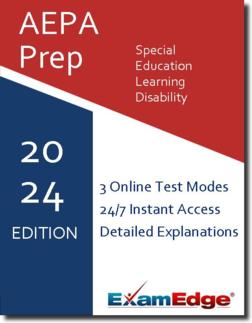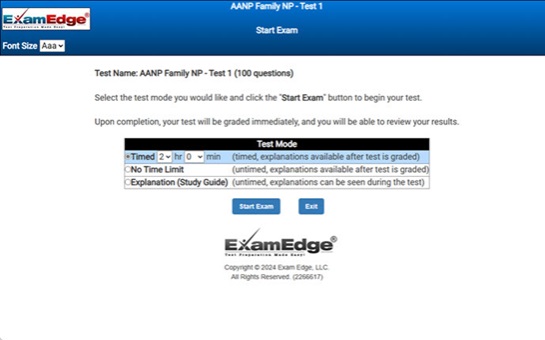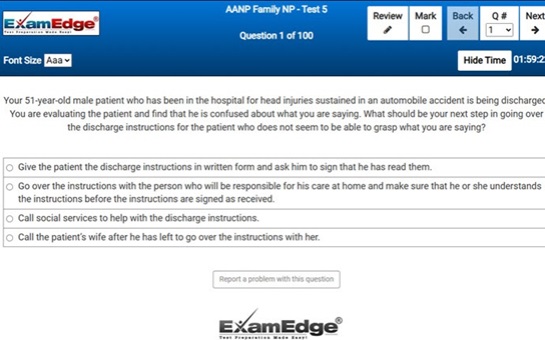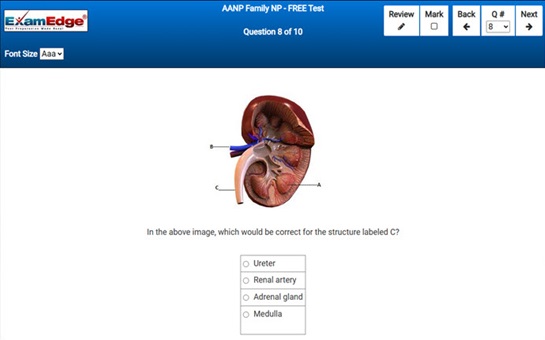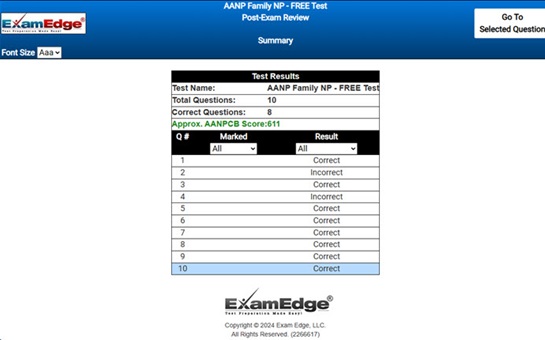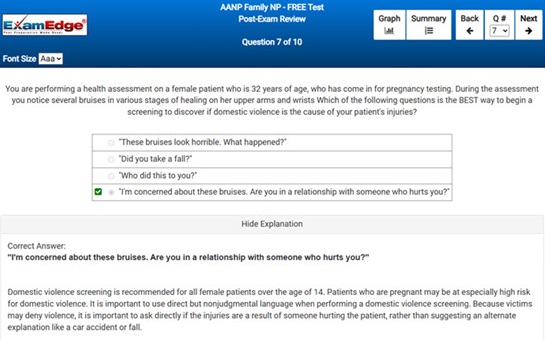AEPA Special Education Learning Disability (27) Practice Tests & Test Prep by Exam Edge - FAQ
Get Instant Online Access Now!
** Sample images, content may not apply to your exam **
Check out our AEPA Special Education Learning Disability FAQs to learn more about the exam, our practice tests, and other information to help you succeed.
Our practice tests are designed to help you master both the subject matter and the art of test-taking. Created to mimic the real exam, our practice tests feature:
- Instant access to your online practice tests - available 24/7
- Timed, untimed, and "study guide" modes
- Detailed explanations for each question
- 15 online practice exams - That's 1,500 unique questions
Review the information below and if you have any additional questions about AEPA SPED Learning Disability practice tests that have not been answered here, Click her to contact Exam Edge Support.
Select Your Test Bundle
Excellent
AEPA Special Education Learning Disability (27) Shortcuts
General Exam Info
Exam Topics
Features
Study Plan Tips
Test Reviews
Why Exam Edge?
FAQ
Take a FREE Test
Why should I use Exam Edge to prepare for the AEPA Special Education Learning Disability Exam?
FAQ's for Exam Edge AEPA Special Education Learning Disability practice tests
We have ten great reasons why Exam Edge is the #1 source on the internet when it comes to preparing for AEPA Special Education Learning Disability test:
- Comprehensive content: Exam Edge's AEPA Special Education Learning Disability practice tests are created specifically to prepare you for the real exam. All our AEPA Special Education Learning Disability practice test questions parallel the topics covered on the real test. The topics themselves are covered in the same proportions as the real test too, based on outlines provided by the Arizona Educator Proficiency Assessments in their AEPA SPED Learning Disability test guidelines.
- Realistic practice: Our AEPA SPED Learning Disability practice exams are designed to help familiarize you with the real test. With the same time limits as the real exam, our practice tests enable you to practice your pacing and time management ahead of test day.
- Detailed explanations: As you complete your practice tests, we show you which questions you answered correctly and which ones you answered incorrectly, in addition to providing you with detailed step-by-step explanations for every single AEPA Special Education Learning Disability practice exam question.
- Performance insights: After you complete a practice test, we provide you with your raw score (how many you answered correctly) and our estimate of the AEPA Special Education Learning Disability score you would have received if you had taken the real test.
- Ease of access: Because all our practice tests are web-based, there is no software to install. You can take AEPA SPED Learning Disability practice exams on any device with access to the internet, at any time.
- Flexible use: If you must pause while taking one of our practice tests, you can continue right where you left off. When you continue the test, you will start exactly where you were, and with the same amount of time you had remaining.
- Thousands of unique questions: We offer 15 different online practice exams with 1,500 unique questions to help you prepare for your AEPA Special Education Learning Disability !
- Low cost: The cost of ordering 5 practice tests is less than the cost of taking the real AEPA SPED Learning Disability test. In other words, it would be less expensive to order 5 practice tests than to retake the real AEPA Special Education Learning Disability exam!
- Our trusted reputation: As a fully accredited member of the Better Business Bureau, we uphold the highest level of business standards. You can rest assured that we maintain all of the BBB Standards for Trust.
- Additional support: If you need additional help, we offer specialized tutoring. Our tutors are trained to help prepare you for success on the AEPA Special Education Learning Disability exam.
What score do I need to pass the AEPA Special Education Learning Disability Exam?
To pass the AEPA Special Education Learning Disability test you need a score of 240.
The range of possible scores is 100 to 300.
How do I know the practice tests are reflective of the actual AEPA Special Education Learning Disability ?
At Exam Edge, we are proud to invest time and effort to make sure that our practice tests are as realistic as possible. Our practice tests help you prepare by replicating key qualities of the real test, including:
- The topics covered
- The level of difficulty
- The maximum time-limit
- The look and feel of navigating the exam
Do you offer practice tests for other Arizona Educator Proficiency Assessments subjects?
Yes! We offer practice tests for 46 different exam subjects, and there are 765 unique exams utilizing 80030 practice exam questions. Every subject has a free sample practice test you can try too!
AEPA - Professional Knowledge
AEPA Assessment Prof Knowledge - ELEM (NT051)
Practice Tests
AEPA Assessment Prof Knowledge - SEC (NT052)
Practice Tests
AEPA Professional Knowledge - EC (AZ093)
Practice Tests
AEPA - Subject Knowledge
AEPA Adult Education English Language Arts (AZ100)
Practice Tests
AEPA Adult Education Mathematics (AZ099)
Practice Tests
AEPA Art (NT503)
Practice Tests
AEPA Biology (NT305)
Practice Tests
AEPA Business (NT309)
Practice Tests
AEPA Chemistry (NT306)
Practice Tests
AEPA Early Childhood Education (AZ036)
Practice Tests
AEPA Earth Science (AZ045)
Practice Tests
AEPA Economics (AZ035)
Practice Tests
AEPA Elementary Education (NT102/NT103)
Practice Tests
AEPA Elementary Education Subtest I (NT102)
Practice Tests
AEPA Elementary Education Subtest II (NT103)
Practice Tests
AEPA English Language Arts (NT301)
Practice Tests
AEPA Essential Academic Skills Mathematics (NT003)
Practice Tests
AEPA Essential Academic Skills Reading (NT001)
Practice Tests
AEPA Essential Academic Skills Writing (NT002)
Practice Tests
AEPA General Science (NT311)
Practice Tests
AEPA Geography (AZ004)
Practice Tests
AEPA Health (NT505)
Practice Tests
AEPA History (NT302)
Practice Tests
AEPA Mathematics (NT304)
Practice Tests
AEPA Math (Middle Grades and Early Secondary) (NT105)
Practice Tests
AEPA Middle Grades General Science (NT204)
Practice Tests
AEPA Middle Grades Language Arts/Reading (NT201)
Practice Tests
AEPA Middle Grades Mathematics (NT203)
Practice Tests
AEPA Middle Grades Social Studies (NT202)
Practice Tests
AEPA Physical Education (NT506)
Practice Tests
AEPA Physics (NT308)
Practice Tests
AEPA Political Science/American Government (AZ006)
Practice Tests
AEPA Principal (AZ181/AX282)
Practice Tests
AEPA Reading Endorsement 6-12 (AZ047)
Practice Tests
AEPA Reading Endorsement K-8 (AZ046)
Practice Tests
AEPA School Library Media Specialist (NT502)
Practice Tests
AEPA Social Studies (NT303)
Practice Tests
AEPA Spanish (NT401)
Practice Tests
AEPA Special Education (NT601)
Practice Tests
AEPA Special Education Early Childhood (AZ083)
Practice Tests
AEPA Special Education Learning Disability (27)
Practice Tests
AEPA Special Education Speech and Language Impaired (AZ031)
Practice Tests
AEPA Special Education Visually Impaired (AZ032)
Practice Tests
AEPA Special Education: Hearing Impaired (AZ026)
Practice Tests
AEPA Superintendent (AZ180)
Practice Tests
AEPA Supervisor (AZ082)
Practice Tests
To order full-length tests, or take a sample test, for a different subject:
Click on ' Name on the Exam Name' You will be take to the orders page
How do I register for the real Arizona Educator Proficiency Assessments?
For up-to-date information about registration for the Arizona Educator Proficiency Assessments, refer to the Arizona Educator Proficiency Assessments website.
AEPA Special Education Learning Disability - FAQ Sample Questions
|
|
|
|

